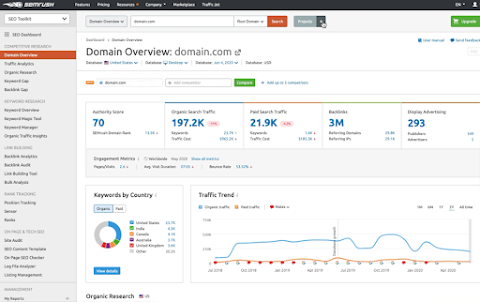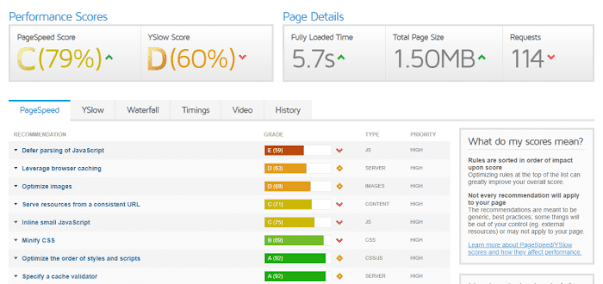In 2020, 93% of digital
experiences started on a search engine.
These experiences can lead to online purchases, quotes, or appointments. As you
will have understood, appearing among the first positions on a search engine
for strategic keywords related to your business is a good idea. This will allow
you to both boost your visibility on the web and increase your turnover.
Natural referencing is a real competition with your
competitors and is based on different criteria. Being well positioned on the
web is a long-term job that should not be done haphazardly. Fortunately, there
are plenty of tools to help you improve your SEO and analyze your performance.
In this article, we show you 10 specific tools that will help you develop your
organic search engine ranking strategy.
1. GOOGLE SEARCH CONSOLE
The Search
Console is a free tool offered by Google.
It is complementary to Google Analytics since it allows you to measure SEO-related performance and to see the
general state of your site. Google Search
Console, therefore, aims to monitor natural referencing and optimize it.
With
this tool, you can:
ensure the indexing of all your pages,
analyze the ergonomics of your website,
detect errors present within your pages,
track your performance related to natural referencing
through different KPIs: number of impressions, clicks, average click-through
rate, average position on the search engine, and even user queries.
2.
AHREFS
Ahrefs is a paid platform, which brings together many very
interesting features. The tool is excellent for creating advanced reports with
precise and useful data. It is possible to create several projects there, which
is very useful, especially for agencies or companies with more than one site.
It offers a
very advanced analysis to its users:
keywords,
organic and paid competition,
the general
performance of the site related to SEO, referring domains,
Ahref stands out mainly for backlinks since this
tool gives much more information on this subject than its main competitors.
3.
SEMRUSH
It is certainly the platform
best known by Internet users. But is it really worth it?
SEMrush is a paid platform, which offers 360° visibilities on SEO
performance:
·
site health audit,
·
keywords,
·
backlinks,
·
commitment,
·
ranking,
·
monitoring of organic and paid performance,
·
estimation of the performance of the competition,
·
follow-up of actions carried out on social networks,
·
etc.
Most marketers find everything
they need here. The only downside, the backlinks part is not sufficiently
complete for an in-depth analysis. Just like Ahrefs, SEMrush allows for
the creation of multiple projects.
4.
GOOGLE KEYWORD PLANNER
This free tool is part of
Google Ads features. It is undeniably useful for selecting suitable and
effective keywords. The planner allows you to find new keywords and their
search volume, but also to check the relevance of the keywords already
used.
Thus,
for the development of an SEO strategy, you can discover in a few clicks which
are the relevant keywords for your site, in accordance with the reality of the
searches carried out by Internet users on Google.
5.
SCREAMING FROG
Screaming Frog is a freemium software for
performing technical and semantic audits of websites. This is installed
locally on a computer. The free version makes it possible to carry out a
simple analysis of the site but nevertheless offers a qualitative inventory. The
paid version is further developed with more features. Thus, Screaming Frog
is suitable for both amateurs and digital professionals.
This software allows you to:
·
get an overview of all the
essential elements for SEO and the health of the website (meta descriptions,
titles, images, internal linking, speed, URLs, etc.)
·
fix canonical URLs,
·
detect duplicate content,
·
detect technical errors,
·
analyze the depth of
clicks,
·
export data and create a
sitemap.xml.
6. UBERSUGGEST
The Ubersuggest
site was acquired in 2017 by Neil Patel. Ubersuggest is available to everyone since it is free. This tool is dedicated to keywords and their
analysis.
If you are looking to develop a
semantic strategy without opting for a paid solution, Ubersuggest will be of
great help to you.
7. GTMETRIX
GTmetrix is a free tool, that specializes in analyzing the
performance and speed of sites. It is therefore very useful in the context
of a technical audit. In addition, this analysis can be carried out
according to specific criteria: web browser, country, city, device.
The operation of GTmetrix is very simple. Just
insert the site URL and click on “Test your site”. You'll get an overall
score, along with details like full load time in seconds, page weight, and a number of HTTP requests. Below these elements, you will find a list of
recommendations to improve this performance.
8. SPEED INSIGHTS PAGE
Google's tool, PageSpeed Insights, serves the same purposes as GTmetrix. Their operation is
very similar. PageSpeed Insights is just as relevant as the previous one
for analyzing the speed of a site. However, we think it is wise to
cross-reference the data from these two sites, in particular, because the
results and recommendations are sometimes slightly different.
9. MYPOSEO
First,
My PoSEO is a 100% French site. The
site offers many possibilities as part of an SEO audit:
·
page positions,
·
keyword research and analysis,
·
evolution of positions,
·
competition,
·
CSV/PDF data export,
·
etc.
At the same time, a multitude of other
functionalities allows you to go much further: analysis of paid referencing,
social networks, and creation of tailor-made dashboards for monitoring.
Overall, this site is great for performance tracking and SEO optimization. On the other hand, it does not seem to us to be developed enough for professional monitoring in comparison with Ahrefs or SEMrush.
10. SEMJI
Semji is
a paid SaaS
platform, allowing you to maximize the ROI of SEO content. Thanks to
AI technologies, Semji users can produce better content in less time. A
considerable asset for Marketing and SEO teams, who will be able to provide
their audience and Google with more relevant content than their competitors.

.png)









